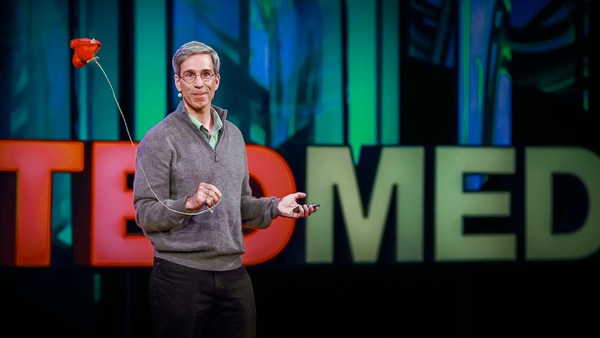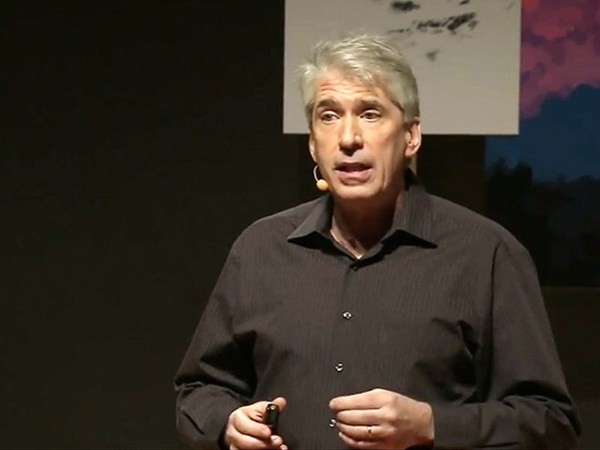Good afternoon. I'd like to talk to you about laughter and the importance of laughter as a skill. And to do so, I'm going to start by discussing some American foreign policy because that's always - (Laughter) absolutely hilarious. (Laughter) Back in 1995, towards the end of the war in the former Yugoslavia, they'd been a very ill-tempered speech given by Boris Yeltsin at the UN about the involvement of the Russian Federation in NATO, and then he had a meeting with Bill Clinton, in which some of these same issues were coming up, and it was considered to be, likely to be a bit of a row. So, what actually happened when these two men came out? They gave a press conference about their summit. And can we learn anything about laughter if we watch this? (Video) Host: Good afternoon. Bill Clinton: Mr. President. (On stage) Sophie Scott: Watch Bill Clinton. (Video) Boris Yeltsin: (In Russian) Ladies and gentlemen, SS: Yeltsin - (Video) BY: (In Russian) dear journalists, SS: ... doesn't sound very happy. (Video) BY: (In Russian) First of all, I have to say that I was coming to this meeting at the invitation of the President of the United States, Bill Clinton, not with the same optimism as I am feeling right now. Interpreter: I want to say, first of all, that when I came here to the United States for this visit at the invitation of the President of the United States, Bill Clinton, I did not, at that time, have the degree of optimism with which I now am departing. BY: And this is all because of you - SS: (Laughter) (Video) BY: because even in all today's newspapers, based on my yesterday's statement at the United Nations, you predicted that our meeting today would be a failure. Interpreter: And this is all due to you, because coming from my statement yesterday in the United Nations, and if you looked at the press reports, one could see that what you were writing was that today's meeting with President Bill Clinton was going to be a disaster. (Laughter) SS: A big laugh. (Video) BY: And now, for the first time, I'm telling you that you have failed. Interpreter: But now, for the first time, I can tell you that you're a disaster. (Laughter) SS: Enormous laugh. (Laughter) Helpless with the laughter. (Laughter) (Video) BC: Be sure you get the right attribution there. (Laughter) SS: Boris Yeltsin now starts laughing. (Laughter) (Laughter) No one's able to get anything done for a while now. That tends to happen with laughter. (Laughter) (Laughter) These guys. (Laughter) So what is laughter? Clearly, that was quite an enjoyable thing in a rather surprising setting. Laughter, actually, is a very interesting behaviour. We tend to associate it with comedy and humour, but laughter is primarily a social behaviour. You're 30 times more likely to laugh with somebody else than if you're on your own. And frequently, this means your laughter happens when you're in conversation, because that tends to be what happens when you're with other people. And very often, that laughter is simply contagious laughter. You laugh just because other people are laughing. You just catch a laugh. You're much more likely to catch a laugh from someone you know than someone you don't know, and in conversations. We're still currently not laughing at jokes and humour with punchlines necessarily. We're laughing to show agreement. We're laughing to show understanding. We're laughing to show that we agree and we see where somebody's coming from. We share that experience. We laugh much more with people we know and people we feel comfortable around. We laugh - we don't laugh rather if we're feeling exposed or we're feeling awkward. When we're comfortable, when we can relax, when we're with people familiar to us, people we like, people with whom we share affection, we laugh even more. When we're children, we learn to laugh, and we learn to laugh primarily in play. And play is a very important behaviour, and we frequently use laughter to indicate that we are playing. The same behaviour could simply be pure aggression (Laughter) where not for the marking of it as play. And this is done with laughter primarily. We will use laughter, not just to show that we're part of the same group of somebody - we like them, we understand them, we agree with them. We will also use laughter to sort of show we understand that they may be trying to make us laugh; we pick up on their intentions. And we'll also use laughter to try and control situations. We'll use laughter to try and make ourselves feel better. And it only works if everybody joins in. If one person's going, "Hahahahaha," and no one else is laughing, that tends not to make anybody feel better at all. (Laughter) If everybody joins in, laughter is actually an effective way of improving the positive mood of a group of people. And people can use laughter because of this link, with sort of de-escalation from stress. People will use laughter to show that they're OK. "I'm angry that you've poured yellow paint all over me. I'm delighted. This is exactly how I hoped my day would go." (Laughter) Charles Darwin, very interestingly, got a lot of stuff right about the sort of how we started to look at emotions in the study of psychology over the next 150 years after his writing. He wrote about things like anger and disgust and fear, but he also wrote a lot about laughter, and we largely ignored that. There's actually very, very little scientific research into laughter. But Charles Darwin thought that laughter was really important, and he thought that at its heart, it was an expression of joy; it's a joyful emotion. And it's joy in play, it's joy in company, it's joy in the company of those we love. I think it's really important to think about that when we think about laughter. We also think about how that could go wrong. Because we learn to laugh. Babies will laugh when they're tickled or somebody plays peek-a-boo with them. But it's a behaviour we can encourage. We learn what laughter means. We learn to understand laughter. And we can see that going wrong. So this is a study that I did with my colleague Essi Viding at UCL last year, where we were studying teenage boys who are at risk of psychopathy. They have conduct disorders, and they have high inputs called callous-unemotional traits. So they're not behaving well, and they don't care if they hurt people. And what we find, when they listen to laughter compared to control teenage boys, who are normally developing, is that behaviourally, they don't find laughter contagious. They don't join in when somebody else laughs, and they don't want to join in when somebody else laughs. If we look at their brain where normally, when people hear laughter, you can see this priming response, you can see people getting ready to join in, they show a significantly reduced effect. Now, we don't know, in this context, if we're seeing this because those boys have always had a problem learning to laugh because of these conduct disorders and these callous-unemotional traits that they have, has that affected how they engage with laughter, or have they never had the opportunity to learn to laugh? Had they not been laughed with? Have they not been played with? Of course, we need a lot more research to look into this. There's an even more extreme condition called "gelotophobia," where people not only don't want to join in when they hear laughter, they are actively frightened and respond aggressively to laughter. They're the kind of person who's walking down the streets, hears laughter, think they're being laughed at and they punch that person. And you never find gelotophobia outside of the most profound psychological disturbances. So in fact, we can see laughter and the reaction to laughter spanning a huge different quality and properties of human experience, and kind of lives that we can live. It can be an incredibly positive social tool, or it can be something that you fear depending on your experiences. So, thinking about that, can we go back to that bit of film and think about why on earth Bill Clinton was laughing. Well, from the start, he's watching Boris Yeltsin like a hawk. All his attention is on him. And he looks like - actually, he's waiting for a reason to laugh. And then he gets his reason, because Boris Yeltsin says his name, Bill Clinton, and he laughs then. It's pure laugh of recognition: "Yes, ha ha ha, my name is Bill Clinton." (Laughter) Don't knock it, if it gets a laugh, it gets a laugh. So that's his reason. He's got going. And then Boris Yeltsin says the line about that you thought it would be a disaster but you're the disaster. Actually, that's a mistranslation; he used the word "failure," and it's mistranslated by the Russian-American interpreter. People have said that Bill Clinton is laughing at this mistranslation. I don't know if that's giving, but possibly he is. Most people probably didn't pick up on that. It's likely that he's now just using that as a reason both to escalate the laughter and also to reframe what is quite an insulting comment by Boris Yeltsin as a joke. He's de-escalating the situation and he's re-presenting it to us as: This guy is hilarious. (Laughter) It completely changes our perception and importantly Boris Yeltsin's perception of what's going on. Boris Yeltsin, "So yeah, I am killing it here." (Laughter) "This is very funny." (Laughter) And he carries on; he now gets a smile out of Yeltsin who cracks, and then he gets his laugh. Boris Yeltsin starts to laugh, and he is laughing primarily here through pure contagion. For a while, they're both incapacitated by the laughter, and that happens with laughter; it will stop you doing anything else for a short amount of time. And then they go back. OK, they're doing OK. So why - why was Bill Clinton laughing? Well, we've got the recognition, and then we've got the the kind of comment, the joke of reframing, and that's actually really important. He is de-escalating and reframes the whole thing. The atmosphere was tense, and he turns that into a positive situation. So he's de-escalating the stress, and he's just reframing everything as "This is great fun we're having, and this is just hilarious. This guy's so funny." He's also showing that he is quite comfortable in that situation. We don't laugh when we feel exposed or awkward. So Clinton's showing he's confident: "This is fine. You guys might have been worried about this. I know we're golden. This guy's hilarious." And that really matters to us. We learn, when we are very, very young, to use our parents laughter as a way of working out whether a situation is serious or not. Children of 12 months old will use their parents laughter, or their absence of laughter, to work out if an unfamiliar situation is something they should worry about. We continue doing that, so it matters that Bill Clinton is doing this. And he's also showing that he's affiliated with Yeltsin. He's showing that he feels affection towards him. And Yeltsin does the same thing. We don't catch laughs off people we don't like. We don't catch laughs off people we don't know. So actually, they're marking their bond there. And the final point that I think is really intriguing is Bill Clinton, at no stage, makes it look like he's laughing at Boris Yeltsin. He goes to great pains to include him. He's not going, "This guy is an idiot. Let's laugh at him." It would mean something very, very different if he did. In fact, I think generally, in American foreign policy, anybody's foreign policy, don't laugh in the face of a premier state from another country. It's probably eight-o'clock day-one of a rule. He includes him in that laughter. And this is a really important factor about laughter. Because laughter is about making and maintaining social bonds, people are very cautious about working out where they are in relation to that. And this does mean you can't just take a difficult situation and throw a squirt of laughter at it; you've got to make sure people feel included in that laughter. They're not feeling excluded or offended by that laughter. And this leads us back to perhaps a more important aspect of laughter. It's an important social skill that we learn to do. We learn about the social use of laughter throughout our entire early adult life, and it's probably one of the more important social skills that we acquire. And we should probably take this a lot more seriously. We should think about the things that can affect our laughter. We can think about the things that we could do to encourage our understanding of our laughter. And perhaps the takeaway message is take laughter seriously. Think about your laughter. Don't undervalue or trivialise your laughter. It matters. It matters a lot. It can sound like friendship. It can sometimes sound a lot like love. Thank you. (Applause)


